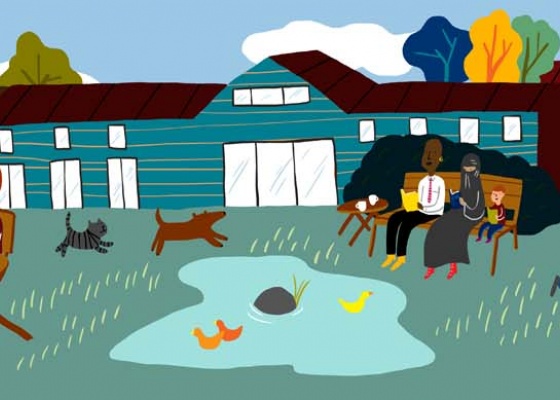The majority (93%) of people who are undernourished are living in the community. For many people, a combination of support services can provide a way for them to remain independent and healthy.
Community projects including day centres, lunch clubs, shopping support services, befriending services and community meals have been found to successfully address many of the causes of malnutrition.
Services can provide practical support to overcome some of the difficulties older people face with eating – including help with shopping and cooking – as well as raise awareness and provide practical advice of the importance of keeping to a healthy weight in later life. Building opportunities for conversations with clients about weight loss or difficulties eating or drinking, and regular screening, is vital to identify any issues and signpost to further support in the community.
There are screening tools that have been developed for use by community groups and volunteers, including the Nutrition Wheel. More information about screening for malnutrition is available here.
The Malnutrition Task Force has also produced resources and practical advice for older people. Copies can be ordered by emailing enquiries@malnutritiontaskforce.org.
Malnutrition Self-Screening Toolkit
In partnership with numerous organisations, we have pulled together tools that have been developed for use in the community by non-clinical staff, including volunteers and carers who work with older people, or by older people and their families. Find out more.
Nutrition and shopping discharge leaflets
Created by Rotherham Doncaster and South Humber NHS Foundation Trust Dietitians, these two leaflets contain really handy tips about eating and shopping after being discharged from hospital. You may like to give the leaflets to an older person you care for to provide them with helpful information.
Wessex AHSN
Grandad's Story
This video is a great reminder of why hydration is so important and how easy it is for an older person to get dehydrated. It also offers simple steps where carers can provide support.
Staying hydrated as we get older
A really useful leaflet which not only offers guidance to older people about staying hydrated but also advice for someone caring for an older person.
Hydration Top Tips Poster
Poster consisting of top tips for improving hydration in older people. It is available as an A4 or A3 version. Great reminder for older people and carers of the importance of staying hydrated.
Undernutrition Awareness and Training
A toolkit of resources (endorsed by the British Dietetic Association) that can be used in a range of health and care setting to promote undernutrition awareness and training. This can be adapted to suit your organisation.
Dignity in care: nutrition for older people at home
Social Care Institute for excellence
This film highlights the role of good nutritional care and hydration for older people living in their own homes.
Dysphagia Guide e-learning resource
Health Education England has worked in partnership with industry experts and care home staff to develop the Dysphagia Guide e-learning resource for those working with people living with dysphagia. The resource is helpful for those working in health and care , informal carers and people with dysphagia themselves.
The resource can be used to support people working in care to gain the relevant level of competency for their role as laid out in the Eating, Drinking and Swallowing Competency Framework.
The PaperWeight Armband
The PaperWeight Armband is a non-medical, non-intrusive tool to identify a person who might be at risk of malnutrition and signpost them to accessible information and advice.
Find out more HERE.

